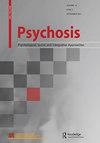对精神病复发的恐惧:利用每天一次的电子自我报告探索与常见复发早期预警信号的动态关系
IF 1
4区 医学
Q4 PSYCHIATRY
Psychosis-Psychological Social and Integrative Approaches
Pub Date : 2023-01-23
DOI:10.1080/17522439.2022.2162955
引用次数: 2
摘要
本文章由计算机程序翻译,如有差异,请以英文原文为准。
Fear of psychotic relapse: exploring dynamic relationships with common early warning signs of relapse using electronic once-a-day self-reports
Background: Fear of relapse into psychosis is an independent risk factor for future relapse events, indicating its importance as a novel intervention target. Methods: Twenty-five participants responded to daily ecological momentary assessment prompts assessing common early warning signs of relapse and self-reported positive experiences like feeling supported by others. We conducted multilevel vector auto-regression using common symptoms assessed in early warning signs monitoring relapse prevention while controlling for positive self-reported experiences like feeling supported by others to estimate three networks (to explore concurrent, temporal and overall relationships). Results: Reporting fear of relapse was positively associated (within the same cross-sectional time window) with hearing voices, alongside anxiety, negative affect and sleep change. Fear of relapse appeared to predict anxiety, negative affect and greater fear of relapse on the next consecutive day. However, none of the typical early warning signs predicted fear of relapse within the temporal window, and the observed relationships were small. Discussion: Early warning signs appeared to be poor predictors of experiencing fear of relapse in this study. Fear of relapse predicts later anxiety and negative affect and may be a valuable intervention target within the daily life of people diagnosed with schizophrenia.
求助全文
通过发布文献求助,成功后即可免费获取论文全文。
去求助
来源期刊
CiteScore
2.20
自引率
8.30%
发文量
36

 求助内容:
求助内容: 应助结果提醒方式:
应助结果提醒方式:


